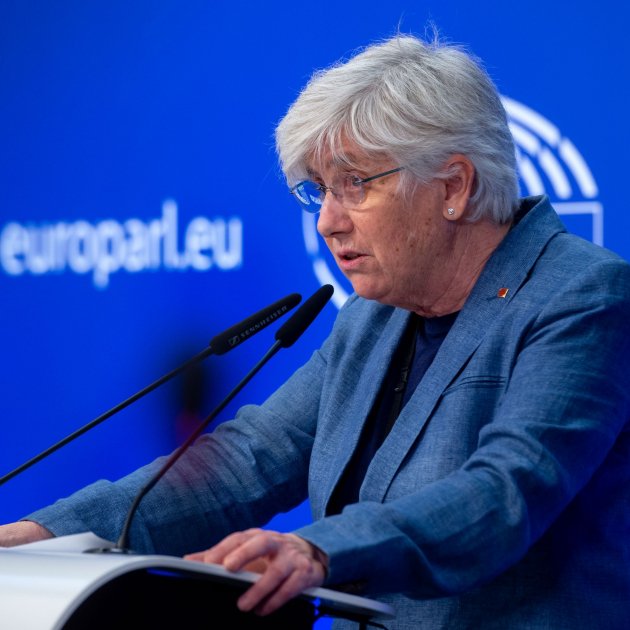Was it really a European Parliamentary debate on Spain's rule of law, or was it, as Catalan MEP Clara Ponsatí portrayed, simply an excuse "to score political points at home" when the two major Spanish parties taking part, the PP and the PSOE, "don't care" about the issue in question? That was how the pro-independence politician characterised this Wednesday's debate in the European chamber in Strasbourg, which had been forced by the People's Party. It included above all, talk about the deadlock of the Spanish judicial institutions, with PSOE and PP deputies accusing each other of being the ones to blame for the situation. Other topics were Spain's "only yes means yes" sexual freedom law and the reforms of the crimes of sedition and misuse of funds, over which the harshest accusations were made by right wing MEPs such as Jordi Cañas (Ciudadanos) and Jorge Buxadé (Vox), against the government of Pedro Sánchez, with numerous comparisons between Spain and Hungary or Poland. However, Ponsatí asserted that despite all the "fuss" made by both sides, the truth was something else: "Nobody cares about the rule of law in Spain," she said bluntly.
In a speech in English lasting just a minute - the time limit that each MEP had - Ponsatí began by pointing out that the PP, the party that had asked for this monographic debate to be held, have themselves "shamelessly instrumentalized Spain's institutions over and over again" when in power, with "friendly judges who look the other way and relentless political persecution". But as for their Socialist opponents who ousted them from government in 2018, "they don't care either": they took over "the repression of a peaceful political movement by any means necessary, including political espionage", she said referring to the CatalanGate mass espionage against the pro-independence community with Pegasus spyware.
But that wasn't all. Ponsatí then pointed her finger at the institution that had "allowed itself to be used as a pawn in this petty political fight": the European Parliament itself. The EU chamber, she said, has never expressed concern about "the systematic violation of the rule of law in Spain". To make her point she suggested a European examination of a subject that both Socialists and Populars are happy to "cover up": "the scandalous corruption of the Spanish monarchy".
Diana Riba in the European Parliament
After Ponsatí, fellow Catalan MEP Diana Riba took part, affirming that in her case she does have a great interest in the health of democracy in the Spanish state, since "our freedom depends on it". Riba also referred to the issues that she considers to be a real threat to the rule of law: "Let's start with the judicial system, which went from Francoism to democracy without any reforms and which, controlled by easily identifiable "surnames", is the favourite weapon of the extreme right and also of that which is not quite so extreme". Next, the ERC deputy identified the criminalization and mobilization of civil society with the so-called "gag law", the 2015 Public Security Act, which has not been repealed, as a major problem, she pointed out. "We could put corruption on the table, but if I start with the two large parties, I would run out of time," joked the Catalan, who also referred, like Ponsatí, to the Pegasus espionage scandal.
Given the problems that she listed in Spanish democracy, Riba was glad that that the issue of the rule of law had been discussed in the European Parliament and she concluded her speech with a wish: "We hope that the same interest they have on the right in promoting electoral debates, they will show in correcting the many democratic deficiencies that have been dragging on for a long time".
Misuse of funds, under examination
Before the intervention of the Catalan MEPs, the spokesperson of the European People's Party, Dolors Montserrat, denounced that "Spain is suffering a serious democratic drift" because of the decisions that Pedro Sánchez has taken, especially due to "the delivery of the Penal Code to those who have tried to attack the constitution", in reference to the Catalan independence movement and the reform of the crimes of sedition and misuse of funds. Didier Reynders, European commissioner for Justice, also spoke about these reforms. He announced that the European Commission is analyzing the reform of the crime of misuse of funds to assess whether the law changes comply with the rules of the European Union, especially in the protection of European funds. Reynders asserted that "the reform introduces changes in different crimes, including misuse of funds. The Commission is currently analyzing these new provisions to verify the compliance of the reform with EU legislation, especially with regard to the protection of the financial interests of the EU".
